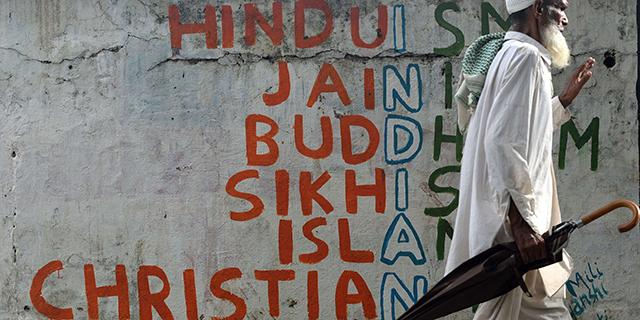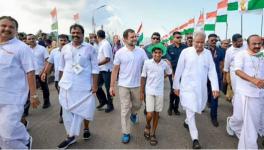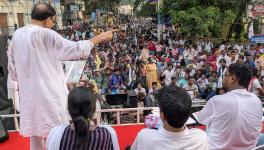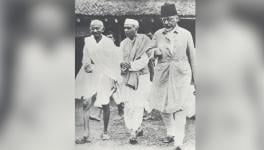Pew Survey on Religion Shows Indians are Hypocrites

The presence of the word tolerant in the Washington-based Pew Research Centre’s report, Religion in India: Tolerance and Segregation, is apt, for its extensive survey shows religious communities do not want to reside in close proximity to each other. And yet they allow each other to practice their faith. It is for this reason that 91% of the Pew survey’s 3,000 respondents affirm the existence of religious freedom in India, where tolerance is considering among its defining features.
But tolerance is a negative term. It acquires the attribute of positivity only because of our realisation that we are capable of something even worse—for instance, harass or kill people because of their religious identity, as we periodically do.
The Pew report shows a substantial number of Indians (45%) do not want as neighbours those who are adherents of a religion different from theirs. They are also adamantly opposed to inter-religion and inter-caste marriages. Non-Muslims think not consuming beef is more important than even believing in God. Likewise, Muslims believe not eating pork is more important than having faith in God. A large percentage of Hindus feel a person cannot be Hindu in case he or she celebrates Eid. Muslims, too, feel their brethren cannot be Muslim if he or she observes Diwali.
Yet, at the same time, 84% of people believe “respect” for other religions is very important for being truly Indian. Another 80% think respect is vital for their own religious identity. The Pew report did not ask its respondents to define the term respect.
It does seem the respondents have a very funny notion of respect, for they do not admire religious communities other than their own, as evident from their desire to live separately from communities to which they do not belong and in whose religious festivals they are opposed to participating. Forms of admiration constitute the very essence of the word respect.
It is possible we have been indoctrinated over time to say, parrot-like, that a true Indian is one who “respects” other religions. In reality, though, respect does not drive the interaction between religious communities. We certainly do not practice what we preach or profess to believe in.
Indeed, the most appropriate term for those who do not practice what they preach is a hypocrite.
The hypocrisy of Indians comes out starkly when granular details in the Pew report are examined. For instance, 85% of Hindus, 78% of Muslims, 78% of Christians, 81% of Sikhs, 84% of Buddhists and 83% of Jains believe respect for other religions is an essential attribute of being truly Indian. These figures would suggest that India is a land of communal harmony. Yet, as seen repeatedly over the years, we are susceptible to the politics of communal polarisation.
We are susceptible because each religious community is acutely aware of its separateness from other communities. Look at these figures—66% of Hindus think Muslims are very different from them. And 64% of Muslims think the same about the Hindus. This feeling of separateness permeates all religious communities, which, in a way, have to be very different from each other because of their different belief systems.
But what is striking is that normal impulses of humanity—for instance, camaraderie—fail to paper over the gap caused by the idea of separateness. Why else would Indians not want as neighbours those who do not belong to their religious communities?
However, responses vary from community to community—36% of Hindus do not want Muslims as their neighbour, but only 16% of Muslims do not want Hindus next door; 31% of Hindus do not want Christians living next to them, but only 11% of them feel the same regarding Hindus; 28% of Hindus do not want Sikhs in their neighbourhood, but only 18% of Sikhs would prefer to live without sharing a boundary wall with Hindus.
It is easy to fathom why Muslims and Christians do not mind living with Hindus. The two religious minorities are largely poor. Those among them who have acquired a degree of prosperity would want to get out of community ghettos. This desire demands that Muslims and Christians negotiate their prejudices to reside in areas that, because of demography, are predominantly Hindu.
That as many as 27% of Hindus do not want even Jains as neighbours is puzzling, more so as both communities are so alike in their food habits and economic status. Only 3% of Jains would not want Hindus next door. These comparative figures suggest Hindus prefer residential homogeneity.
Not at all puzzling is the near-universal opposition to men and women marrying out of their religious communities, given the political controversy over inter-faith marriages in recent years. 67% of Hindus, a whopping 80% of Muslims, 59% of Sikhs, 46% of Buddhists and 66% of Jains are opposed to women of their communities marrying men of other faiths. More or less similar numbers oppose men marrying outside their communities.
A lower percentage of Christians (37%) are opposed to inter-faith marriages. As to why, the answer perhaps lies in the Pew finding that Christians who are urbane and have accessed higher education show “somewhat lower levels” of religious observance.
On the other hand, a higher Muslim opposition to inter-religious marriages springs from the Islamic injunction that Muslim men can marry Jew and Christian women. However, Muslim women are proscribed from taking Jews and Christians as partners. A telling example of patriarchy! Muslim men and women cannot wed those who are neither Jew nor Christian without their partners undergoing conversion. Nevertheless, conversion, the Pew report shows, remains negligible for all communities.
The hypocrisy of Indians scales incredible heights when it comes to gauging their sense of who is truly Hindu or Muslim. Thus, 72% of Hindus say a person cannot be Hindu if he or she eats beef; 63% of them say those Hindus who celebrate Eid cannot be Hindu. By contrast, only 49% says a person who does not believe in god cannot be Hindu.
Likewise, 58% of Muslims say those among them who celebrate Diwali cannot be Muslim, and 77% of them say a person who eats pork cannot be Muslim. However, 60% of Muslims say an atheist cannot be Muslim.
God is the pivot of all religions, although not necessarily of spiritualism. Yet, a higher proportion of Hindus and Muslims think beef and pork and celebrating festivals are far more important markers of their religiosity than having faith in god. This shows that the politics of our time has turned religion into an ideology, and the centrality of god in the belief system of communities will likely be subordinated to practices turned into hot-button issues of everyday politics.
The Pew report helps plumb the Indian psyche on two other counts. Only 20% of Indians say there is caste-based discrimination in India, although 27% of Dalits think there is. More people in the South (30%) than in the North (22%) and the Central (13%) think discrimination on account of caste exists.
In a country where people are killed for sporting twirled-up moustaches or riding a motorcycle or mare, the Pew findings regarding the low incidence of caste-based discrimination are surprising. Add to this the fact that the National Crime Records Bureau has been consistently reporting a rise in the violence against Dalits over the years.
Only the hegemony of caste ideology can explain the Pew findings—people think the discrimination they encounter is normal or justified. More people in the South than in the North or Central India affirmed discrimination exists. This is largely because the opposition to caste inequalities is stiffer in the South than anywhere else in India, thus making more people aware of discrimination.
The most controversial aspect of the Pew report is its finding that 64% of Hindus think being Hindu is important to be truly Indian. Another 59% feel speaking Hindi defines the true Indian. These two types of Hindus are largely present in Central India (83% and 87%) and North India (69% and 71%) than in the South (42% and 27%). Nearly 30% of Hindus who voted the BJP (49% of all Hindus did in the 2019 elections) think being Hindu and speaking Hindi are both very important to be truly Indian.
This finding ties up very neatly with the reluctance of religious communities, particularly Hindus, to live together, their opposition to celebrate religious festivals not theirs, their hostility to inter-religious and inter-caste marriages, and their disdain for foods habits different from theirs. How do we then explain that an overwhelming number of people believe that respect for all religions is the essence of being truly Indian and truly religious? The explanation is: Our hypocrisy, which is common to all communities.
The author is an independent journalist. The views are personal.
Get the latest reports & analysis with people's perspective on Protests, movements & deep analytical videos, discussions of the current affairs in your Telegram app. Subscribe to NewsClick's Telegram channel & get Real-Time updates on stories, as they get published on our website.
























